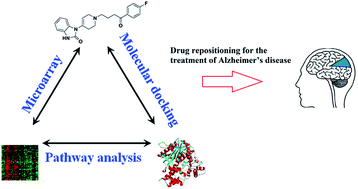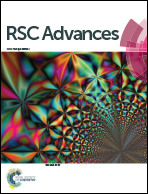In silico drug repositioning for the treatment of Alzheimer's disease using molecular docking and gene expression data†
Abstract
Alzheimer's disease (AD) is a multifactorial neurodegenerative disorder that affects the elderly. Despite the devastating effects of this disease, therapeutic methods for the treatment of AD remain limited, as many factors contribute to its etiology. In recent decades, many small molecules and bioproducts have been developed for the treatment of AD; however, there are still no drugs that produce efficient disease-modifying effects. Drug repositioning is an alternative methodology for drug discovery because many effective drugs act via the modulation of multiple targets, and this ‘poly-pharmacology’ can be a therapeutic requirement for complex diseases. The multifactorial nature of AD strongly supports the rationale for a drug design strategy centered on drug repositioning. In this study, a computational pipeline based on ligand–protein inverse docking and gene expression data mining were adopted to explore potential drugs for the treatment of AD. We performed a virtual screening of 1553 FDA-approved drugs on seven major AD drug targets. Several drugs showed extremely high binding free energies for the seven targets. Furthermore, gene expression data represent a very rich alternative resource for inferring non-obvious relationships between drugs and genes. The gene expression profiles in response to the identified drugs support the docking results and offer a plausible perspective on the pathways associated with protein responses to drug binding in AD patients. The results have led to the discovery of droperidol, glimepiride, risperidone and other FDA-approved drugs as potential multi-target candidates for the treatment of AD.


 Please wait while we load your content...
Please wait while we load your content...